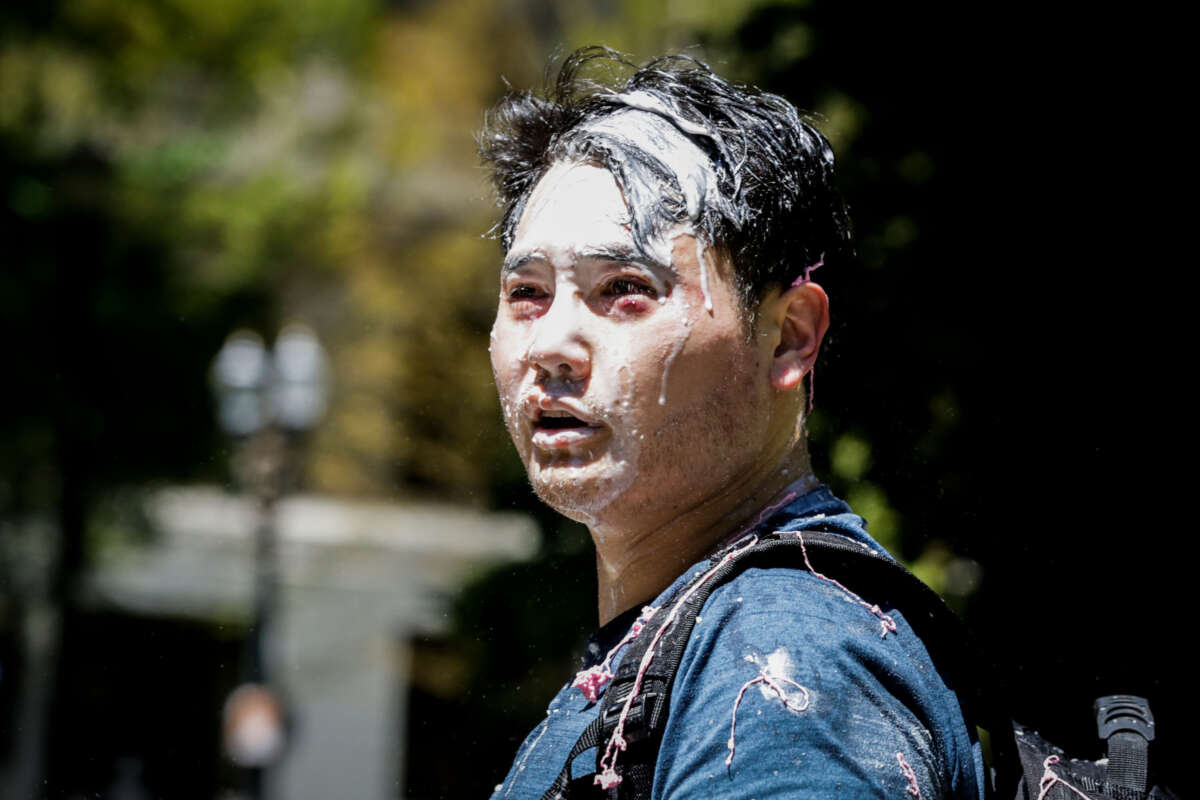Did you know that Truthout is a nonprofit and independently funded by readers like you? If you value what we do, please support our work with a donation.
A jury in Portland, Oregon, ruled against conservative provocateur Andy Ngo this week in a civil lawsuit he filed three years ago against local activists over multiple allegations of assault, including an embarrassing incident in 2019 when Ngo was hit in the face with a milkshake during a far right rally and counterprotest.
“The jury’s verdict was a resounding affirmation that Multnomah County is not home for hate-filled far right extremist provocateurs like Andy Ngo who incite others to commit racist and antisemitic acts of violence and intimidation,” said Lauren Regan, director and attorney at the Civil Liberties Defense Center, in a statement this week.
While the “milkshake incident” gained Ngo some sympathy from liberals concerned about press freedoms, nowadays he is probably best recognized less as a journalist and more as an internet troll who targets anti-fascists. The word “antifa” is short for anti-fascist and often used by politicians and pundits to rile up the MAGA base and conflate broad social movements with small groups of rowdy protesters seen on TV. Ngo’s social media posts are notorious for inspiring trolls to harass journalists, academics and activists perceived as leftist.
After seven days of trial, a 12-person jury found no fault against activists John Hacker and Elizabeth Richter in a lawsuit that sought over $300,000 for a variety of alleged incidents involving multiple people between 2019 and 2021, according to the Civil Liberties Defense Center, which supported the defendants. Ngo originally sought $900,000 from multiple defendants, but at least three defendants were dropped from the lawsuit, and the judge dismissed a racketeering complaint after determining that Rose City Antifa is not a legal entity.
Anti-fascist protest groups such as Rose City Antifa in Portland are often informal rather than organized nonprofits, and it’s unclear whether protesters who chased down Ngo could be considered “members” of the Rose City formation. The protesters were anonymous and wearing masks, which Ngo and others often hail as proof of some broad conspiracy. Rumors and memes about leftists throwing milkshakes full of wet concrete that day in 2019 have been debunked.
However, by the time Ngo’s lawsuit went to trial, the case was focused on a 2021 incident in which Ngo was tackled and beaten by masked protesters during a rally marking the anniversary of the police murder of George Floyd. Ngo accused defendants of identifying him as a target and being partly responsible, but attorneys for the defendants said they were not involved in the attack and argued Ngo manufactures conflict and controversy for attention.
Ngo attempted to link defendants to a broader “antifa” movement, but the defense argued the masked protesters who roughed up Ngo have never been identified. The jury did not find the remaining two defendants liable for any of the assaults after both sides accused the other of doxxing, which Hacker said left him and his family facing harassment and death threats online, according to local reports.
“The evidence overwhelmingly showed that identifying an infamous provocateur is protected speech and does not amount to assault and battery,” said Cooper Brinson, an attorney representing Richter, in a statement.
Of the alleged incidents of assault — including a phone being slapped out of Ngo’s hand by a frustrated Hacker, who later apologized in court — the “milkshake incident” of 2019 is best known. During a rally that brought Proud Boys and other far right extremists into the streets of Portland, Ngo was hit in the face with a milkshake before being chased and roughed up by counterprotesters.
The “milkshake incident” went viral on social media in 2019, and according to Portland-based journalist Shane Burley, Ngo soaked up the attention and refocused “his entire career on ‘antifa,’ a word that, in this context, has to be put in quotations.”
“Over the past few years, the term [antifa] has become a mainstream right-wing bogeyman, and Ngo has been a prime cultivator of the trend,” Burley wrote in a review of Ngo’s book about “unmasking” antifa. “The ‘milkshake incident’ in 2019 was videotaped; it led his celebrity on the right to skyrocket … and delivered him huge sums of money through crowdfunding.”
Regan said Ngo lumps a wide range of social justice advocates into his version of “antifa,” including members of moderate groups such as the Wall of Moms in Portland. Ngo then attempts to gain access to personal information about those he perceives as leftist activists to post online and turn a profit on Patreon and other social media platforms.
In a social media post, Ngo said he was disappointed in the ruling but is considering his options for further legal action. It’s unclear whether the judge will ask Ngo to pay court and attorneys’ fees now that a jury has ruled against him.
A terrifying moment. We appeal for your support.
In the last weeks, we have witnessed an authoritarian assault on communities in Minnesota and across the nation.
The need for truthful, grassroots reporting is urgent at this cataclysmic historical moment. Yet, Trump-aligned billionaires and other allies have taken over many legacy media outlets — the culmination of a decades-long campaign to place control of the narrative into the hands of the political right.
We refuse to let Trump’s blatant propaganda machine go unchecked. Untethered to corporate ownership or advertisers, Truthout remains fearless in our reporting and our determination to use journalism as a tool for justice.
But we need your help just to fund our basic expenses. Over 80 percent of Truthout’s funding comes from small individual donations from our community of readers, and over a third of our total budget is supported by recurring monthly donors.
Truthout has launched a fundraiser to add 500 new monthly donors in the next 10 days. Whether you can make a small monthly donation or a larger one-time gift, Truthout only works with your support.
